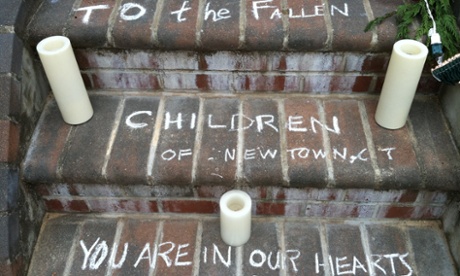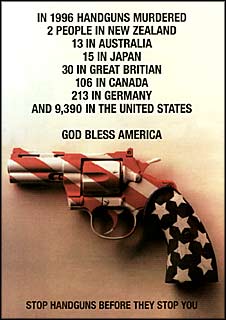
Photo by Richard Adams; published on guardian.co.uk
Yesterday, a young man entered an elementary school in Newtown, Connecticut, and opened fire on both staff and students, killing 20 children and 6 adults. It was later found that he had also killed his own mother, bringing his total victim count to 27.
Following the tragedy, news outlets and social media were ablaze with horror and misery, vigils were held for the victims and their families, and a nation mourned for the innocent lives so cruelly snatched away by a senseless act of brutality.
It is always heart-rending to hear about a school shooting. Yet, what I find even more upsetting is the fact that this is nothing new. We’ve seen it all before—in 2007 at Virginia Tech; in 2006 at Pennsylvania, in 2005 at Red Lake High School, Minnesota; in 1999 at Columbine High School—and so on. As President Obama tearfully said in a televised statement, America has “been through this too many times.” Each time it happens, we find ourselves shaking our heads in shock and bewilderment. Who is this guy? What is his personal history? What could have driven him to this? We obsess over the minutiae of the perpetrator’s psychology, treating it as an isolated, freak incident, while missing the larger pattern that is woven by each and every case. If we miss the pattern, then we cannot expect to find a solution. And without a solution, we are doomed to experience such tragedies over and over again.
The Newtown shooting has reignited an ongoing debate about gun control in America, which is a promising start. Although America has always felt strongly about the right to bear arms (in a Gallup poll conducted last year, 55% felt that the gun laws should either remain the same or become even more lenient), public opinion is shifting towards gun control, with many taking to Twitter or Facebook to voice their support for tighter restrictions.

From changingworld.com
While I very much agree with the call for tighter gun control, and hope that Obama’s reference to “meaningful action” is more than just rhetoric, I feel that a fixation on the idea of guns as the main problem loses sight of the root of the issue. After all, 27 people died yesterday not because an out-of-control gun went on a rampage, but because a man picked up a gun, aimed, and pulled the trigger, 27 times. There are two issues that need attention here—the ease of obtaining and carrying a gun, but also the murderers themselves.
And when we do examine the perpetrators, there is a glaring pattern that is frequently overlooked; that is, the gendered dimension of the attacks. In response to yesterday’s shooting, The Telegraph did a short recap of the ten worst school shootings in the US. Out of this list, 100% of the perpetrators were male. About two months ago, Mother Jones ran a report on mass shootings in America. According to the article, there have been 62 incidents in the last 30 years, and 61 out of the 62 perpetrators were male. And according to the Bureau of Justice Statistics, it is men who commit over 90% of violent crimes in America, and start 100% of wars.
The problem is, whenever people (usually feminists) point this out, they are met with cries of “misandry” and “demonization of men.” People (usually men) are quick to point out all the acts of heroism done by men, drawing attention to the brave policeman who saved countless civilians, to the self-sacrificing husband who protected his wife and children, frequently followed by a command to the female gender to be grateful to men for protecting them from, well, other men.
But if we want the level of violence in society to decrease, we cannot afford to ignore the gendered aspect of crime. We need to take a close look at male culture, and ask ourselves what lessons we teach young boys about what it means to be a man. We need to question the link between masculinity and power, between masculinity and dominance, and ask ourselves why little boys grow up needing to achieve both these qualities, which frequently translates into being either a hero or a villain. Most of all, we need to address the crisis in male emotional health, and ask ourselves why crying, expressing love, fear, or hurt, are emotional outlets that are denied to most men and boys. When the only emotion that a man can legitimately express is anger, how can we be surprised that many men turn to violence in response to emotional issues?
I do not buy biological reasons for male violence, especially since tests concerning the difference between male and female brains have largely been inconclusive. (For more on this, look up Delusions of Gender by neurologist Cordelia Fine.) Most men are not violent criminals, and to simply accept men’s near-monopoly on violence as a reflection on male nature is unfair. We as a society, with our rigid gender roles and our glorification of (male) aggression and power, continue to churn out violent men, and perpetuate the dynamic we were born into. But I firmly believe that we can also change it.
How many more young men have to be imprisoned before we acknowledge a problem with the values they’ve been brought up with? How many more children have to die, and how many more families have to grieve?
I’m ready for a safer world. And I know you are too.